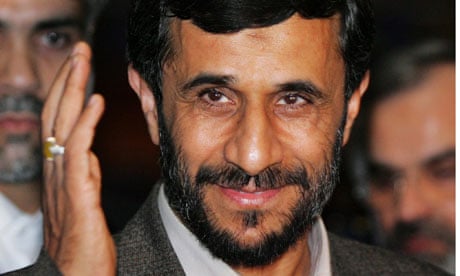Iran is to postpone nuclear talks with the west as a "punishment" for the imposition of new UN sanctions that are designed to it stop enriching uranium, President Mahmoud Ahmadinejad said today.
Negotiations would be put off until after Ramadan in late August, he said, though no talks have in fact been scheduled. "It's a punishment to teach them a lesson to know how to have a dialogue with nations," he told reporters in Tehran. Ahmadinejad also repeated that Iran would retaliate if attempts were made to inspect its ships, as sanctions permit.
Earlier, the Iranian leader had complained of a hidden agenda. "The western and US sanctions and threats are not only aimed at putting the brakes on Iran's progress in nuclear technology, but come to keep Iran from becoming an economic and industrial power," he told a crowd in Natanz in Isfahan province.
Separately, Iran's foreign ministry dismissed as "psychological warfare" an assessment by the CIA that the Islamic republic already has enough uranium to make two nuclear weapons. Ramin Mehmanparast, the ministry spokesman, called the comments by Leon Panetta, the CIA chief, "propaganda" intended to allow the US to avoid nuclear disarmament. "What Iran is pursuing is only in the framework of the rights that its membership of the International Atomic Energy Agency entitles it to," Mehmanparast said. "The real concern is disarmament and non-proliferation."
Panetta said on ABC TV's This Week on Sunday that Iran has amassed enough low-enriched uranium to produce two nuclear weapons within two years. Earlier this month there was a similar assessment from the UN's nuclear watchdog, the International Atomic Energy Agency.
Iran says its nuclear programme is for civilian power generation and has rebuffed demands by the UN security council that it suspend uranium enrichment. On 9 June the council approved a fourth set of sanctions on Iran, while the US Congress last week approved new bilateral measures, as did the EU.
Panetta also said he believed the sanctions would "probably not" deter Iran from pursuing its nuclear ambitions and pointed to US disagreements with Israel over Iran's intentions. "There is a continuing debate right now about whether or not they [Iran] ought to proceed with a bomb. But they clearly are developing their nuclear capability and that raises concerns," Panetta said.
His comments brought an expression of concern from Russia's president, Dmitry Medvedev. "Such information is always worrying and all the more so because the international community does not recognise the Iranian nuclear programme as transparent," he told reporters at the G20 summit. "If this is proved, it would make the situation even more tense."
Russia has in the past been reluctant to impose hard-hitting sanctions but backed the latest UN resolution following Tehran's repeated defiance and clashed publicly with Iran over its change of tack. Israel's president, Shimon Peres, today expressed "appreciation" of Medvedev's statement.
Reports from Dubai said that the UAE central bank has ordered financial institutions to freeze 41 Iran-linked accounts, in line with the UN sanctions. UN resolution 1929 calls for measures against new Iranian banks abroad if a connection to the nuclear or missile programmes is suspected, as well as vigilance over transactions with any Iranian bank.
